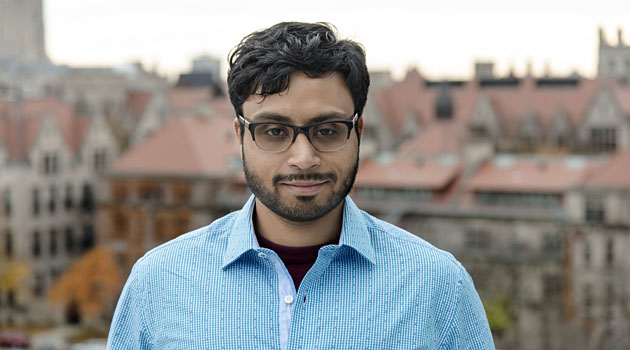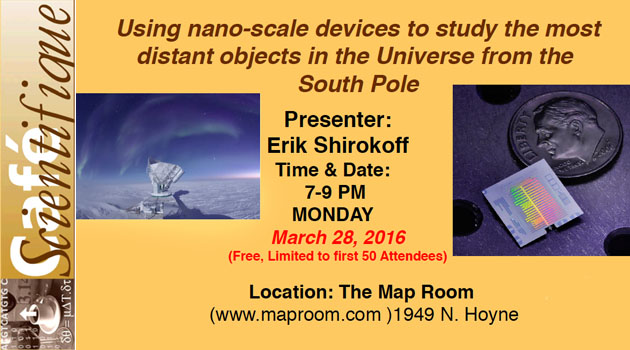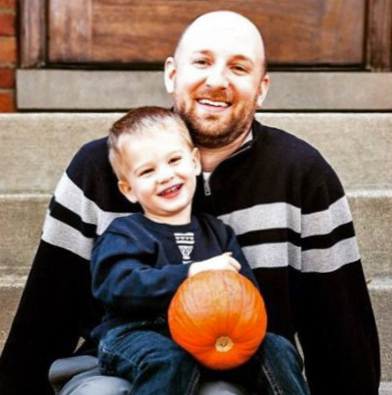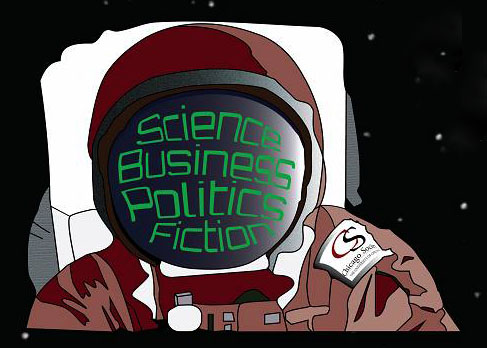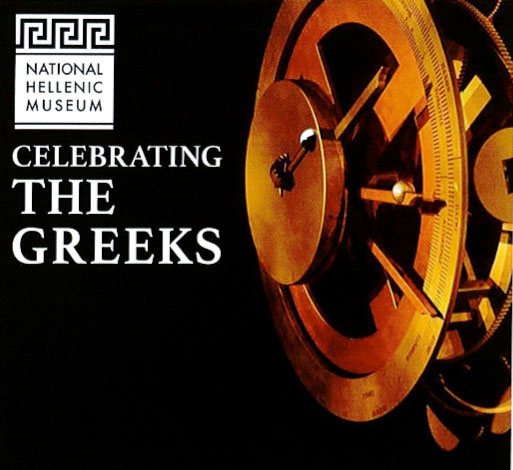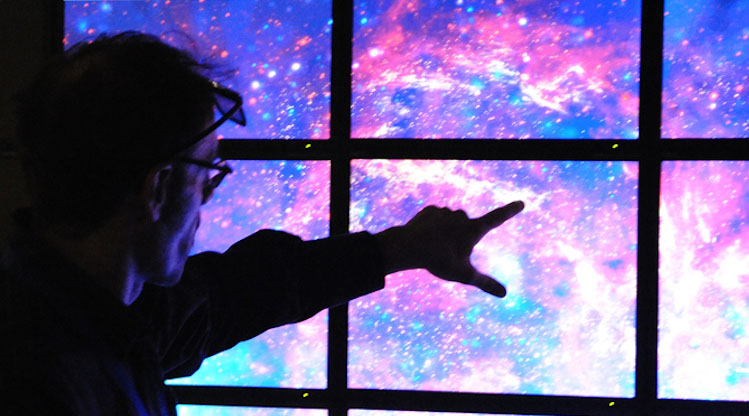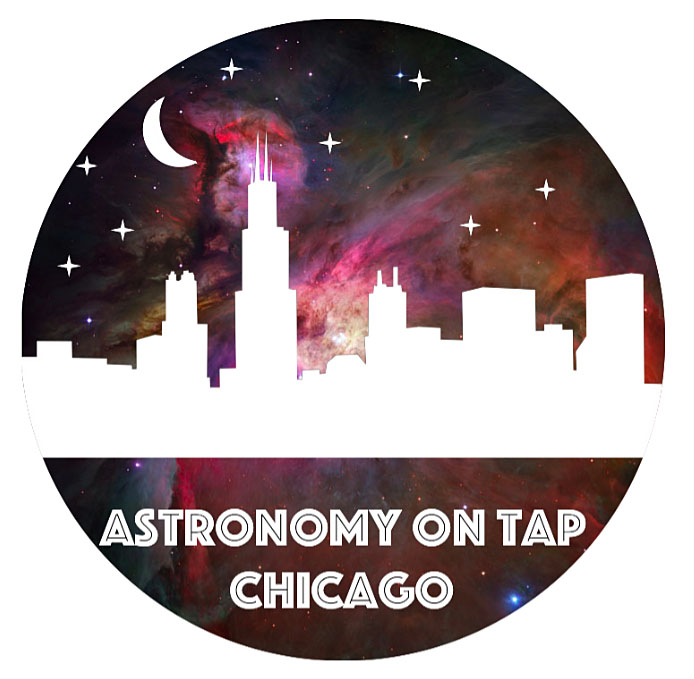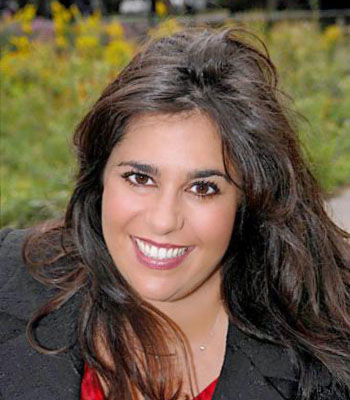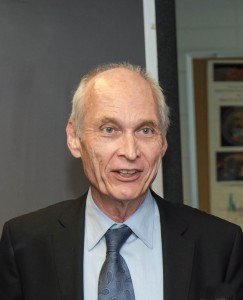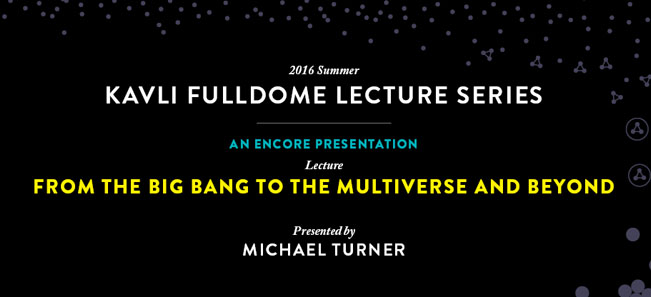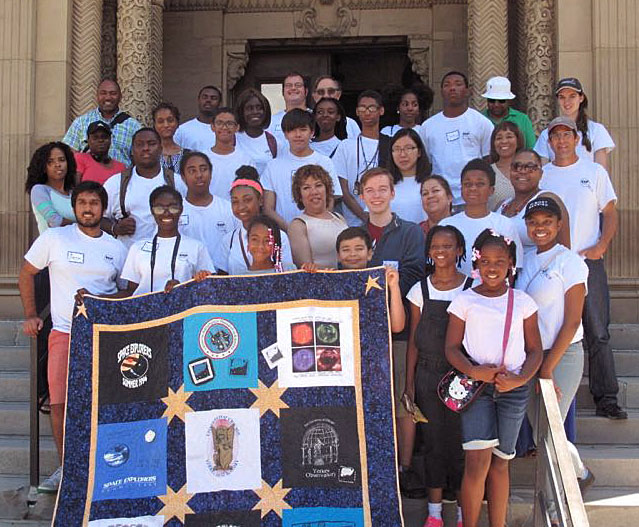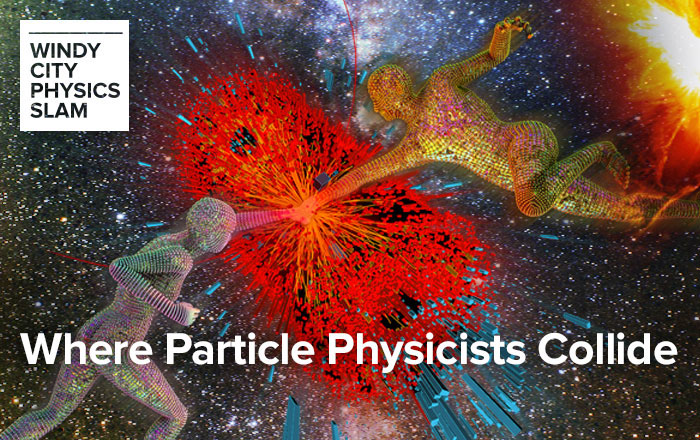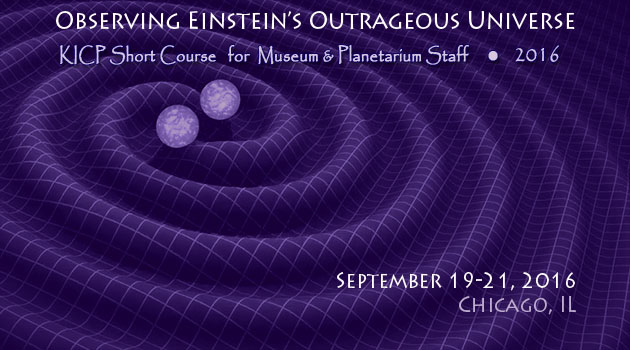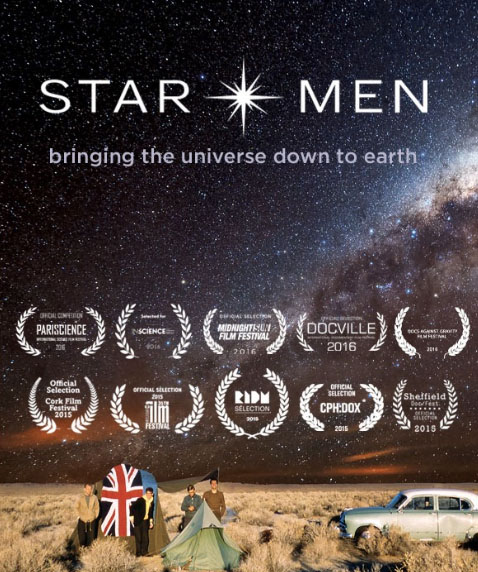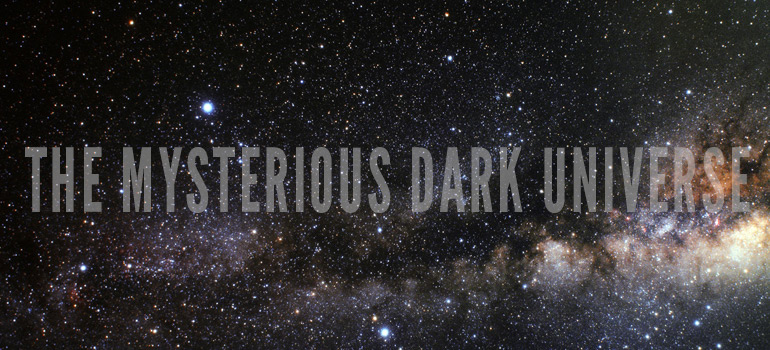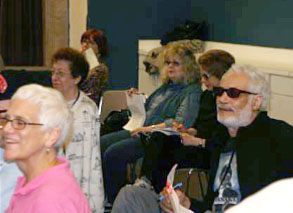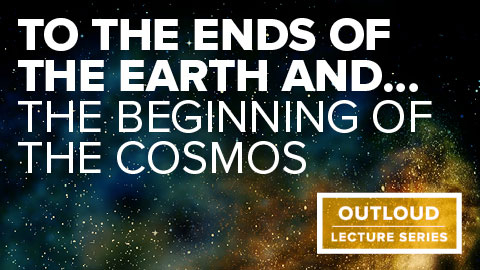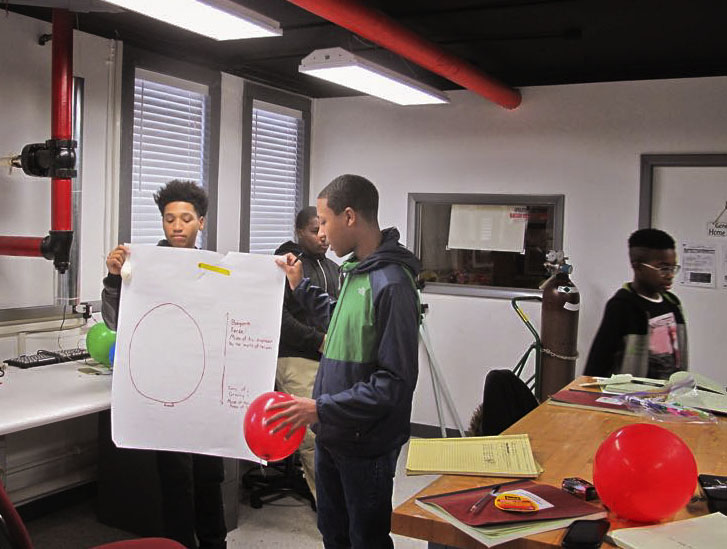 |
 |
 |
 |
 |
 |
 |
 |
 |
 |
 |
 |
|
Outreach
|
2016
Abigail Vieregg, "CMB, Neutrinos, Cosmic Rays" Astronomy Conversation Ali Vanderveld, "Cosmology, Gravitational Lensing" Astronomy Conversation Zhen Hou, "Cosmic Microwave Background" Astronomy Conversation Phil Mansfield, "Computational Astrophysics & Large Dark Matter Structures" Astronomy Conversation Rick Kessler, "Astrophysics, Dark Energy" Astronomy Conversation Sean Johnson, "Fingerprinting the stars" KICP Life Long Learning Series Organizer: Daniel Grin Rick Kessler - "Astrophysics, Dark Energy", Alan Zablocki - "Cosmology, Neutrinos, Dark Energy", and Cosmin Deaconu - "Cosmic Rays, Neutrinos, Dark Matter" Astronomy Conversation Megan Bedell - "Exoplanets" Astronomy Conversation Stephen Hoover - "Cosmology, Cosmic Microwave Background" Astronomy Conversation Cameron Liang - "Galaxy Formation & Evolution" Astronomy Conversation Ross Cawthon - "Cosmology, Dark Energy" Astronomy Conversation Ali Vanderveld, "Cosmology, Gravitational Lensing " Astronomy Conversation Dan Fabrycky - "Exoplanets" Astronomy Conversation Phil Mansfield - "Computational Astrophysics & Large Dark Matter Structures" & Sean Mills - "Exoplanets" Astronomy Conversation Rick Kessler - "Astrophysics, Dark Energy" Astronomy Conversation Amy Bender - "Cosmology, South Pole Telescope, Galaxy Clusters" Astronomy Conversation Cosmin Deaconu - "Cosmic Rays, Neutrinos, Dark Matter" Astronomy Conversation C2ST Speakeasy: Ritoban Basu Thakur, "Dark Matter -- The Dark Path to our Being" Website KICP Talk Everything we see today, our precious atoms and molecules, got here by traveling on swaths dark matter. From the oscillations of the hot plasma of the primordial universe, to the formation and dynamics of modern galaxies, dark matter plays a necessary role. The very construct in which we sit is defined by its abundance. Our universe’s evolution is controlled tightly by a cosmic tug-of-war between dark matter and dark energy. Thus understanding dark matter is not only important to explain the past and the present, but also the future trajectory of our universe. It has been over 80 years since its discovery, and we have yet to “see†dark matter directly. This talk will discuss how we came to know about dark matter and the multitude of concordant observations. Next, we will discuss our best ideas regarding the nature of dark matter and detection strategies being pursued world-wide. Dr. Ritoban Basu Thakur is an experimental cosmologist at the Kavli Institute for Cosmological Physics (KICP), at the University of Chicago. His research focuses on understanding early universe physics by precise measurements of the cosmic microwave background, and progressing experimental techniques toward terrestrial detection of dark matter. To this end, he is developing novel detectors and analyzing observational data collected via these detectors. Dr. Basu Thakur obtained his PhD in Physics from the University of Illinois at Urbana Champaign. The crux of his PhD research, on dark matter, was carried out at the Fermilab Center for Particle Atrophysics. He was URA fellow and graduate student association officer at Fermilab. He got his B.S. in Physics, and graduated Phi Beta Kappa (liberal arts and sciences) from Dickinson College. Jason Henning - "CMB Polarization, Instrumentation" Astronomy Conversation Stephen Hoover - "Cosmology, Cosmic Microwave Background" Astronomy Conversation Cosmin Deaconu - "Cosmic Rays, Neutrinos, Dark Matter" Astronomy Conversation Sean Johnson, "Barcoding the stars" KICP Life Long Learning Series Organizer: Daniel Grin Ali Vanderveld - "Cosmology, Gravitational Lensing" Astronomy Conversation Alan Zablocki - "Cosmology, Neutrinos, Dark Energy" & Faustin Carter - "CMB, Detector fabrication, South Pole Telescope" Astronomy Conversation Cameron Liang - "Galaxy Formation & Evolution" Astronomy Conversation Phil MansPhil Mansfield - "Computational Astrophysics & Large Dark Matter Structures" Astronomy Conversation Rick Kessler - "Astrophysics, Dark Energy" Astronomy Conversation Nahee Park - "High Energy Astrophysics" Astronomy Conversation Cafe Scientifique: Erik Shirokoff, "Using nano-scale devices at the South Pole to study the most distant objects in the Universe" Talk Some of the most distant objects in the Universe can only be studied with submillimeter wavelength instruments. These ancient objects include the cosmic microwave background - relic radiation left over from the the Big Bang - and the galaxies that hosted the first generation of stars. To see these distant signals we employ microscopic superconducting devices operating a fraction of a degree above absolute zero. And to see through the earth's atmosphere, we operate telescopes in some the most remote locations on Earth, including the South Pole and the Atacama Desert. We will talk about the instruments, the remote observatories we're building, and what we hope to reveal with them. Dan Fabrycky - "Exoplanets" Astronomy Conversation Broader Horizons: Joshua Carter, quantitative analyst at Citadel in Chicago Talk I joined Citadel as a quantitative researcher in 2013 after completing a Hubble Fellowship. Citadel is a Chicago-based global financial institution offering asset management, retail execution/market making and trading technologies. Quantitative researchers (or "quants") are responsible for developing, testing and maintaining sophisticated, automated trading models. I will give a candid overview of this sector, giving my personal experience and offering advice for a similar transition. UChicago Conference: "Space: Speculation and Exploration" Website Workshop The University of Chicago's Conference titled "Space: Speculation and Exploration" is a day long event, hosting speakers from across the country. The conference aims to inspire public fascination and contemplation of the universe by connecting renowned professors and experts on space from various fields of science, economics, politics, and fiction with University of Chicago students and community members. KEYNOTE Robert Rosner- University of Chicago Professor in Astronomy and Astrophysics and Physics SCIENCE PANEL Jay M. Pasachoff- Williams College Professor in Astronomy Brian Fields- University of Illinois Professor in Astronomy Grace Wolf-Chase- Adler Planetarium Astronomer Zoltan G. Levay - Imaging Group Lead in the Office of Public Outreach at Space Telescope Science Institute Scott Sandford- NASA Astrophysicist BUSINESS AND POLITICS PANEL Eligar Sadeh- CEO of Astroconsulting Charles Blandchard- former General Counsel of the Air Force and the Army David Livingston- Host of The Space Show FICTION PANEL Eric S. Rabkin- University of Michigan Professor of English Language and Literature and Professor of Art & Design Robert J. Scherrer- Vanderbilt University Professor and Chair of the Department of Physics and Astronomy and science fiction blogger John Hemry- New York Times Best Selling Author of The Lost Fleet series Robert Buettner- National Bestselling Author of Jason Wander and Orphan's Legacy series Daniel Scolnic, "The life stories of Stars" KICP Life Long Learning Series Organizer: Daniel Grin Jason Henning - "CMB Polarization, Instrumentation" & Sean Mills - "Exoplanets" Astronomy Conversation Phil MansPhil Mansfield - "Computational Astrophysics & Large Dark Matter Structures" Astronomy Conversation Rick Kessler - "Astrophysics, Dark Energy" Astronomy Conversation Joshua Frieman in the Deborah Stratman film "The Illinois Parables" Website Workshop For the last 25 years, Deborah Stratman (BFA 1990) has explored the landscape of our national history and psyche in riveting films, sculpture, sound, and public works. With THE ILLINOIS PARABLES, she turns her attention to the “American microcosm†and its storied past. Bracketed by sweeping aerial shots of the state’s ancient prairies and waterways, Stratman spins eleven tales of natural disaster, messianic devotion, technological breakthrough, government resistance, and unsolved mystery. Together, these stories ask how the systems of belief they represent have shaped how we see the land, ourselves, and our nation. 16mm. (Amy Beste) The World's Oldest Computer: The Antikythera Mechanis Website Lecture More than 21 centuries ago, Greek scientists created a mechanism that used brass gearwheels to predict the movements of the sun, the moon, and probably most of the planets, essentially inventing the world's first computer. Found by Greek sponge divers in an ancient shipwreck, its corroded remnants, now known as the Antikythera Mechanism give us fresh insights into history and challenge our assumptions about technology transfer over the ages. Dr. John Seiradakis, Radio Astronomer and Physics Professor at the Aristotle University of Thessaloniki, Greece, will discuss the work of an international team of experts who used 21st century technology to decode the truth behind the world's first computer. This program will also feature the artwork of two local artists inspired by the Antikythera Mechanism: Terry Poulos and Keith Skogstrom. Astronomy Conversations Training Session Workshop Join us for a volunteer training session where you will learn about the Astronomy Conversations Program, the Adler Space Visualization Lab and science communication techniques. SVL and Astronomy Conversations Andrew Long, "Dark Matter" KICP Life Long Learning Series Organizer: Daniel Grin Ross Cawthon - "Cosmology, Dark Energy" Astronomy Conversation Stephen Hoover - "Cosmology, Cosmic Microwave Background" Astronomy Conversation Chicago Astronomy on Tap Event This Monday, April 18, is the inaugural Chicago Astronomy on Tap! For those who are unfamiliar with the concept, Astronomy on Tap is a public outreach initiative at bars across 10 US cities (and Santiago, Chile) that involves informal astronomy talks and astronomy trivia (and beer!). This event will be held at The Map Room (off the blue line, 1949 N. Hoyne) at 7 pm, and Laura will be giving a talk on 'Prospects for Detecting Alien Life in the Next Decade.' We hope to see you there! Astrophysics for Older Adults Lecture Presenters: Karen Kolb Flude, Daniel Grin. Beginning in 2013, the KICP has developed an astrophysics outreach effort to older adults (formerly known as senior citizens). This program has brought fundamental and cutting-edge content in astronomy to older adults at Chicago senior centers, retirement homes, and public libraries. The material has been presented by graduate students, postdocs, and faculty at the KICP, the University of Chicago's Astronomy/Astrophysics Department, Physics Department, and even broader pool including biologists at the UofC, as well as scientists at FermiLab, the Adler Planetarium, and the Field Museum. After briefly introducing the program, we'll cover how to effectively reach out to this audience. This event is a perfect entry point to participate in the program! After a ~1 hour presentation, participants will have an opportunity to present slides for critique and improvement, and discuss the program more informally. Cameron Liang - "Galaxy Formation & Evolution" Astronomy Conversation Alan Zablocki - "Cosmology, Neutrinos, Dark Energy" Astronomy Conversation Cosmin Deaconu - "Cosmic Rays, Neutrinos, Dark Matter" Astronomy Conversation Nahee Park - "High Energy Astrophysics" Astronomy Conversation Faustin Carter - "CMB, Detector fabrication, South Pole Telescope" Astronomy Conversation Evan Shockley, "Dark Matter" KICP Life Long Learning Series Organizer: Daniel Grin Amy Bender - "Cosmology, South Pole Telescope, Galaxy Clusters" Astronomy Conversation Ali Vanderveld - "Cosmology, Gravitational Lensing" Astronomy Conversation Ross Cawthon - "Cosmology, Dark Energy" Astronomy Conversation Megan Bedell, "Planets around other stars" KICP Life Long Learning Series Organizer: Daniel Grin Kavli Lecture: Michael Turner, "From The Big Bang To The Multiverse & Beyond" Michael Turner, Director of the Kavli Institute of Cosmological Physics and the Bruce V. and Diana M. Rauner Distinguished Service Professor at the University of Chicago WebsiteLecture Lecture Flyer [PDF] 7:30 pm - 9:00 pm: Lecture and Q&A Session 9:00 pm - 10:00 pm: Speaker Reception with Refreshments Presented by The Kavli Foundation The Kavli Foundation fulldome lecture will be streamed live at fourteen other institutions including the American Museum of Natural History (NY, NY), the Denver Museum of Nature and Science and the Pacific Science Center (Seattle, WA). This dome-cast will allow audiences across the country to immerse themselves in the presentation in real time and ask questions. We know the Universe began 13.7 billion years ago in an explosion of space called the Big Bang. We also know that the gravity of dark matter created the galaxies and other cosmic structures we see today from tiny quantum fluctuations that arose just after the Big Bang. Yet some big questions remain. Is our Universe part of a larger multiverse? What is speeding up the expansion of the Universe? These are the mysteries that inspire cosmologists today. In a dazzling, fulldome presentation, this presentation will illustrate what we know and how we know it, as well as the big ideas and puzzles of cosmology today. On May 5, the University of Chicago's Michael Turner will explore some of the biggest mysteries in modern cosmology. About Michael Turner Michael S. Turner is a theoretical astrophysicist and the Bruce V. and Diana M. Rauner Distinguished Service Professor at the University of Chicago. He is also Director of the Kavli Institute for Cosmological Physics at Chicago. Turner helped to pioneer the interdisciplinary field of particle astrophysics and cosmology, and has made seminal contributions to the current cosmological paradigm known as "LambdaCDM", including the prediction of cosmic acceleration. His current research interests are dark matter, dark energy and inflation. Turner has won numerous prizes and is a member of the National Academy of Sciences. About the Kavli Fulldome Lecture Series The Kavli Fulldome Lecture series takes audiences on a journey to the very edges of human knowledge. Adler experts and leading scientists work together to create dazzling, animated images of real data, which are projected onto the planetarium dome during the lectures. Audiences don't have to imagine what an equation might tell us about the Universe’s distant past, they can travel back in time and see it with their own eyes. Current list of institutions participating in the dome-cast:
Jason Henning, "Going to the end of the earth to study the beginning of the universe" KICP Life Long Learning Series Organizer: Daniel Grin Nahee Park - "High Energy Astrophysics" Astronomy Conversation Daniel Holz, "The Discovery of Gravitational Waves" KICP Life Long Learning Series Organizer: Daniel Grin Cameron Liang, "The realm of galaxies" KICP Life Long Learning Series Organizer: Daniel Grin Faustin Carter - "CMB, Detector fabrication, South Pole Telescope" Astronomy Conversation Zoheyr Doctor, "The discovery of gravitational waves" KICP Life Long Learning Series Organizer: Daniel Grin Faustin Carter - "CMB, Detector fabrication, South Pole Telescope" Astronomy Conversation Broader Horizons: Korey Haynes, associate editor at Astronomy Magazine KICP Talk After completing my PhD at George Mason University studying exoplanets, I joined the staff of Astronomy in December 2014. Astronomy is the largest general level magazine of its type, serving fans of both the science and hobby sides of the field. As an editor, I work closely with scientists and science writers to make stories ready for publication, write for print and the web, and manage large tracts of our website. I will talk about my experiences in the field, and address specifically the transition from scientist to science communicator. Megan Bedell - "Exoplanets", Nan Li - "Gravitational Lensing" Astronomy Conversation Evan Shockley, "Dark Matter" KICP Life Long Learning Series Organizer: Daniel Grin Jason Henning - "CMB Polarization, Instrumentation", Nan Li - "Gravitational Lensing" Astronomy Conversation Cameron Liang - "Galaxy Formation & Evolution" Astronomy Conversation Rick Kessler - "Astrophysics, Dark Energy" Astronomy Conversation Jason Henning - "CMB Polarization, Instrumentation", Amy Bender - "Cosmology, South Pole Telescope, Galaxy Clusters" Astronomy Conversation Dan Fabrycky - "Exoplanets" Astronomy Conversation Rick Kessler - "Astrophysics, Dark Energy" Astronomy Conversation Evan Shockley - "Dark Matter" Astronomy Conversation Stephen Hoover - "Cosmology, Cosmic Microwave Background" Astronomy Conversation Alan Zablocki - "Cosmology, Neutrinos, Dark Energy" Astronomy Conversation Nan Li - "Gravitational Lensing" Astronomy Conversation Chicago Area Agency on Ageing Field Trips to Adler Planetarium KICP Life Long Learning Series KICP affiliated volunteers: Daniel Grin, Evan Shockley, Geza Gyuk, Faustin Carter Zhen Hou - "Cosmic Microwave Background" Astronomy Conversation Cameron Liang - "Galaxy Formation & Evolution" Astronomy Conversation Diana Dragomir, "Exoplanets" KICP Life Long Learning Series Organizer: Daniel Grin David Grossnickle, "Paleontology" KICP Life Long Learning Series Organizer: Daniel Grin Faustin Carter - "CMB, Detector fabrication, South Pole Telescope", Ross Cawthon - "Cosmology, Dark Energy" Astronomy Conversation Stacy Rosenbaum, "Gorilla preservation" KICP Life Long Learning Series Organizer: Daniel Grin Andrew Long, "Dark Matter" KICP Life Long Learning Series Organizer: Daniel Grin Diana Dragomir, Faustin Carter - "CMB, Detector fabrication, South Pole Telescope", Maya Fishbach Astronomy Conversation Dan Fabrycky - "Exoplanets" Astronomy Conversation Stacy Rosenbaum, "Gorilla preservation." KICP Life Long Learning Series Organizer: Daniel Grin Jason Henning - "CMB Polarization, Instrumentation" Astronomy Conversation Stephen Hoover - "Cosmology, Cosmic Microwave Background" Astronomy Conversation Stephanie Baumgart, "Dinosaurs and how they fly" KICP Life Long Learning Series Organizer: Daniel Grin Rick Kessler - "Astrophysics, Dark Energy" Astronomy Conversation Stephanie Baumgart, "Pterosaur flight" KICP Life Long Learning Series Organizer: Daniel Grin The 2016 Summer Kavli Fulldome Lecture: Michael Turner, "From The Big Bang To The Multiverse And Beyond" Website KICP Lecture We know the Universe began 13.7 billion years ago in an explosion of space called the Big Bang. We also know that the gravity of dark matter created the galaxies and other cosmic structures we see today from tiny quantum fluctuations that arose just after the Big Bang. Yet some big questions remain. Is our Universe part of a larger multiverse? What is speeding up the expansion of the Universe? Theoretical astrophysicist Michael Turner has devoted his life and research to the pursuit of the answers to these questions. On July 31, the esteemed University of Chicago Professor will return to the Adler Planetarium for a reprise of the lecture that he delivered to a sold-out crowd on May 5. In a dazzling, fulldome presentation custom-made by the Adler's Space Visualization Lab, this presentation will illustrate what we know and how we know it, as well as the big ideas and puzzles of cosmology today. As an important feature of the Kavli Fulldome Lecture Series, Turner's presentation will be live domecasted from the Adler to other planetaria around the country and the world. Stay tuned as locations are added. About Michael Turner Michael S. Turner is a theoretical astrophysicist and the Bruce V. and Diana M. Rauner Distinguished Service Professor at the University of Chicago. He is also Director of the Kavli Institute for Cosmological Physics at Chicago. Turner helped to pioneer the interdisciplinary field of particle astrophysics and cosmology, and has made seminal contributions to the current cosmological paradigm known as "LambdaCDM", including the prediction of cosmic acceleration. His current research interests are dark matter, dark energy and inflation. Turner has won numerous prizes and is a member of the National Academy of Sciences. About The Kavli Fulldome Lecture Series The Kavli Fulldome Lecture series takes audiences on a journey to the very edges of human knowledge. Adler experts and leading scientists work together to create dazzling, animated images of real data, which are projected onto the planetarium dome during the lectures. Audiences don’t have to imagine what an equation might tell us about the Universe's distant past, they can travel back in time and see it with their own eyes. Sponsor: The Kavli Foundation Dan Fabrycky - "Exoplanets" Astronomy Conversation Dan Scolnic, "Dark Energy" KICP Life Long Learning Series Organizer: Daniel Grin Spy vs. Spy, Yerkes Summer Institute KICP Yerkes Institute Instructors: Camille Avestruz, Zoheyr Doctor, Gourav Khullar, Richard G. Kron, Randall H. Landsberg, James Lasker, Phil Mansfield, Sam Passaglia, Rebecca Pierce, Jason Poh. The 2016 Yerkes Summer Institute (YSI) was filled with secrecy, deception, and espionage. At YSI, high school students in the Space Explorers program played the role of 20th-Century spies to handle secret information: revealing, concealing and distorting information. Through three day-long lab activities, the students explored connections between spying and science. In the "Secret Photos" lab, they studied angular size, resolution, and the film-development process in order to effectively gather information on "enemy operatives" using 35 mm cameras. In the "Radio Beams" lab, students designed, built, and tested a system to transmit audio via an amplitude-modulated (AM) laser, which allowed them to secretly communicate across long distances. Lastly, techniques to securely communicate were examined in the "Codes and Ciphers" lab, which also served as an introduction to modern cryptography. After cycling through these three day labs, the students broke into three new groups and took one of the labs a step further: one group doctored photographs to spread false information, another built AM radio transmitters and receivers, and the last created treasure hunts using codes and ciphers for the clues. Nighttime activities included: observations with the Yerkes telescopes, astrophotography, explorations of the constellations which focused on what current research can tell us about them (e.g. most know exoplanets were found by Kepler in the constellation Cygnus); and bad weather activities that included examinations of the veracity of viral internet photos, and stories of famous spies. The week's spy-themed activities not only introduced the students to the importance of privacy in the digital age, but also to the concepts and skills that are integral to any modern STEM career. Windy City Physics Slam: Where Particle Physicists Collide Website Event Come see five particle physicists from around the world put on a show about the mysteries of the universe. In a high-energy competition, they'll share the mysteries of dark matter and dark energy, shine a light on ghostly neutrinos, and uncover the very structure of the universe. Host Tom Skilling, WGN-TV chief meteorologist Featured Speakers
Jason Henning - "CMB Polarization, Instrumentation" Astronomy Conversation Stephen Hoover - "Cosmology, Cosmic Microwave Background" Astronomy Conversation Rick Kessler - "Astrophysics, Dark Energy" Astronomy Conversation Zoheyr Doctor KICP Life Long Learning Series Organizer: Daniel Grin Maurizio de Pitta, "Einstein's Brain" KICP Life Long Learning Series Organizer: Daniel Grin Nicole Larsen, "Dark Energy" KICP Life Long Learning Series Organizer: Daniel Grin Andrew Long, "Dark Matter" KICP Life Long Learning Series Organizer: Daniel Grin Amy Bender - "Cosmology, South Pole Telescope, Galaxy Clusters" Astronomy Conversation Cosmin Deaconu - "Cosmic Rays, Neutrinos, Dark Matter" Astronomy Conversation Gourav Khullar, Daniel Dutcher - "Cosmology with the South Pole Telescope" Astronomy Conversation Stephen Hoover - "Cosmology, Cosmic Microwave Background" and Nicole Larsen - "Physics, Dark Matter and CMB telescope" Astronomy Conversation Rick Kessler - "Astrophysics, Dark Energy" Astronomy Conversation Maya Fishbach, Ross Cawthon - "Cosmology, Dark Energy " Astronomy Conversation Dan Fabrycky - "Exoplanets" Astronomy Conversation Cameron Liang - "Galaxy Formation & Evolution" Astronomy Conversation "Observing Einstein's Outrageous Universe", Short Course for Museum & Planetarium Staff Website KICP Cosmology Course Observing Einstein's Outrageous Universe: Gravitational Waves, Black Holes, Neutron Stars, Gravitational Lenses and the Big Bang Who Should Attend: Museum & Planetarium Staff What to Expect:
Course Description A century ago Einstein put forth his theory of gravity. For the first 50 years it was an exotic theory with many untestable predictions thought to be irrelevant to our Universe. Beginning 50 years ago with the discovery of quasars and the cosmic microwave background (CMB), it has become clear that we live in Einstein’s Universe where the extraordinary is now the ordinary and his theory is in full bloom. To study the Universe today you have to understand the cosmic implications of Einstein's theory. We will focus on observable aspects of some of the most outrageous and compelling predictions of general relativity. These predictions include black holes, gravitational waves, gravitational lensing, and the Big Bang. We will explore the recent detection of gravitational waves from the merger of black holes 30 times the mass of our Sun, the spectacular fireworks associated with the death of stars and the formation of neutron stars and black holes, precise measurements of properties of the supermassive black hole at the center of our galaxy, the bending of light due to the gravity of clusters of galaxies, and how we learn about the origin of space, time, and the earliest moments of the Universe. Screening & Discussion: STARMEN Website KICP Event The screening will included a conversation with Director Alison Rose, Kavli Prize Laureate Donald Lynden-Bell, KICP Director Michael Turner, and KICP associate director John Carlstrom. Sponsored by: The Kavli Institute for Cosmological Physics (KICP) and The Kavli Foundation STARMEN Ben Farr, "Gravitational Waves" KICP Life Long Learning Series Organizers: Randy Landsberg, Erik Shirkoff, Daniel Scolnic & Andrew Long Faustin Carter - "CMB, Detector fabrication, South Pole Telescope" Astronomy Conversation Andrew Long, "Dark Matter" KICP Life Long Learning Series Organizers: Randy Landsberg, Erik Shirkoff, Daniel Scolnic & Andrew Long Sav Sethi, "String Theory" KICP Life Long Learning Series Organizers: Randy Landsberg, Erik Shirkoff, Daniel Scolnic & Andrew Long Sean Mills - "Exoplanets" Astronomy Conversation Nicole Larsen, "Dark Matter and CMB telescope" Astronomy Conversation Rick Kessler, "Astrophysics, Dark Energy" Astronomy Conversation Stephen Hoover, "Cosmology, Cosmic Microwave Background" Astronomy Conversation Ben Farr, "Gravitational Waves" Astronomy Conversation Cosmin Deaconu, "Cosmic Rays, Neutrinos, Dark Matter " Astronomy Conversation Gourav Khullar & Nora Shipp Astronomy Conversation Cameron Liang, "Galaxy Formation & Evolution" Astronomy Conversation Faustin Carter, "The time machine at the South Pole" KICP Life Long Learning Series Organizers: Randy Landsberg, Erik Shirkoff, Daniel Scolnic & Andrew Long Daniel Dutcher - "Cosmology with the South Pole Telescope" and Nan Li - "Gravitational Lensing" Astronomy Conversation 2016 Leon Lederman Lecture: Rocky Kolb, "The Mysterious Dark Universe" Website Talk Edward W. "Rocky" Kolb of the University of Chicago will give the 2016 Leon Lederman Lecture in Physics on Monday, October 24 from 3:30-5 p.m. in the Robert A. Pritzker Science Center, Room 111. Kolb is the Arthur Holly Compton Distinguished Service Professor of Astronomy & Astrophysics at Chicago. The eminent cosmologist studies the application of elementary particle physics to the very early universe. In his lecture "The Mysterious Dark Universe," he will explore how the answer to the question of what the universe is made of is not simple. Astronomical observations tell us that 95 percent of the universe is missing. Most of the mass of the universe is in a mysterious form known as dark matter, and most of the energy in the universe is in an even more mysterious form known as dark energy. Dark matter and dark energy will determine the ultimate fate of our universe, Kolb says; understanding the nature of the dark universe is the biggest challenge facing cosmology today. Kolb is a member of the Enrico Fermi Institute and the Kavli Institute for Cosmological Physics at Chicago, as well as dean of physical sciences. In 1983, he helped to found the Theoretical Astrophysics Group and in 2004 was the founding director of the Particle Astrophysics Center at Fermi National Accelerator Laboratory. He is a fellow of the American Academy of Arts and Sciences and the American Physical Society, among many other awards and honors. In addition to over 200 scientific papers, he is a co-author of The Early Universe, the standard textbook on particle physics and cosmology. Read more. "Rocky Kolb is an excellent and accomplished astro-particle physicist with an outstanding ability to make complex concepts understandable to the public,” said Grant Bunker, chair and professor of physics. The lecture is sponsored by the Department of Physics and honors physicist Leon Lederman, who won the Nobel Prize in Physics in 1988 with Melvin Schwartz and Jack Steinberger and was the Pritzker Professor of Physics at Illinois Tech from 1992-2012. Members of the physics faculty and others have pledged money to permanently endow the Lederman lecture. Cafe Scientifique: Dan Scolnic, "Tension in the Universe: Dark Energy, Dark Matter & Different Numbers" Talk Dear Cafe Denizens, As we transition from summer into fall, I am happy to announce our autumn cafe scientifique and an astronomy related movie screening. "Tension in the Universe: Dark Energy, Dark Matter & Different Numbers" Dan Scolnic Time & Date: 7-9 PM Monday October 24, 2016 Location: The Map Room, 1949 N. Hoyne (Free, Limited to first 50 Attendees) (others can join the cafe email list at - Cafe Email list: http://tinyurl.com/cafelist ) Mike Gladders, "Gravitational Lensing" KICP Life Long Learning Series Organizers: Randy Landsberg, Erik Shirkoff, Daniel Scolnic & Andrew Long Life Long Learning Training Session KICP Workshop In conjunction with the KICP Life Long Learning program, we are hosting a training session focused on working with older adults. Gerontologist Karen Kolb will conduct a workshop that will explore demographic trends, the physiology and psychology of aging, and practical considerations for presenting to older adults. Camille Avestruz, "Structures in our Universe" KICP Life Long Learning Series Organizers: Randy Landsberg, Erik Shirkoff, Daniel Scolnic & Andrew Long Argonne OutLoud: Clarence Chang, "To the ends of the Earth...and the beginning of the cosmos" Website Talk The depths of the cosmos can only be matched by the innumerable questions we have about it. Scientists have attempted for hundreds of years to gain a clear picture of how the universe was formed. Our current understanding of it is the best so far, but there is still so much more to know. But just how do researchers study the beginning the universe? Physicist Clarence Chang (Argonne National Laboratory and Kavli Institute for Cosmological Physics at the University of Chicago) collaborates with a group of researchers using the South Pole Telescope, which is equipped with a unique Argonne-made sensor technology to measure and characterize thermal radiation signatures generated billions of years ago. He will also provide highlights of his research travels to the Antarctica and the South Pole. Sam Passaglia, "Physics of Star Trek" KICP Life Long Learning Series Organizers: Randy Landsberg, Erik Shirkoff, Daniel Scolnic & Andrew Long Faustin Carter - "CMB, Detector fabrication, South Pole Telescope" and Nan Li - "Gravitational Lensing" Astronomy Conversation Dan Fabrycky - "Exoplanets" Astronomy Conversation Zohyer Doctor, "100 Years in the Making: The Detection of Gravitational Waves" KICP Life Long Learning Series Organizers: Randy Landsberg, Erik Shirkoff, Daniel Scolnic & Andrew Long Abigail Vieregg - "CMB, Neutrinos, Cosmic Rays " Astronomy Conversation Jason Henning - "CMB Polarization, Instrumentation", Ross Cawthon - "Cosmology, Dark Energy" Astronomy Conversation Stephen Hoover - "Cosmology, Cosmic Microwave Background", Nicole Larsen - "Physics, Dark Matter and CMB telescope" Astronomy Conversation Andrew Long, "Demystifying Dark Matter" KICP Life Long Learning Series Organizers: Randy Landsberg, Erik Shirkoff, Daniel Scolnic & Andrew Long Faustin Carter - "CMB, Detector fabrication, South Pole Telescope" Astronomy Conversation Nan Li - "Gravitational Lensing" Astronomy Conversation Sean Mills - "Exoplanets" Astronomy Conversation Rick Kessler - "Astrophysics, Dark Energy" Astronomy Conversation Leslie Rogers, "Exoplanets: The Diversity and Demographics of Distant Rocky Worlds" KICP Life Long Learning Series Organizers: Randy Landsberg, Erik Shirkoff, Daniel Scolnic & Andrew Long Jason Henning - "CMB Polarization, Instrumentation", Nan Li - "Gravitational Lensing" Astronomy Conversation Maya Fishbach, Sean Mills - "Exoplanets" Astronomy Conversation Cameron Liang, "Galaxies: A Tour through Our Universe" KICP Life Long Learning Series Organizers: Randy Landsberg, Erik Shirkoff, Daniel Scolnic & Andrew Long Adam Miller, Faustin Carter - "CMB, Detector fabrication, South Pole Telescope" Astronomy Conversation Abigail Vieregg - "CMB, Neutrinos, Cosmic Rays " Astronomy Conversation Stephen Hoover - "Cosmology, Cosmic Microwave Background" Astronomy Conversation Up & Down, Yerkes Winter Institute KICP Yerkes Institute Instructors: Randy Landsberg, Phil Mansfield, Eric Oberla, and Erik Shirokoff. The 2016 Yerkes Winter Institute (YWI) focused on the forces that lift objects up and what happens when they are pushed down. Twenty local high schoolers in the Space Explorers program participated in three labs led by Erik Shirokoff, Eric Oberla, Phil Mansfield, and Randy Landsberg, which focused on pressure and buoyancy. This year's activities included weighing a car using only an air pressure gauge and a sheet of paper, determining how many party balloons it would actually take to lift the house in the film Up! (or the ANITA experiment), and a camp-wide competition where students used Archimedes' Principle to design boats that could carry as many pennies as possible. The activities in this year's YWI will help prepare the Space Explorers for the launch of a high altitude balloon which they will be performing later in the year. Nighttime activities included observations with the 24-inch telescope, identifying constellation and interesting astrophysical objects that they contain, and a slide show of the recent launch of ANITA in Antarctica. Thirty-seven parents and siblings joined the last day of YWI for presentations and closing ceremony. |

